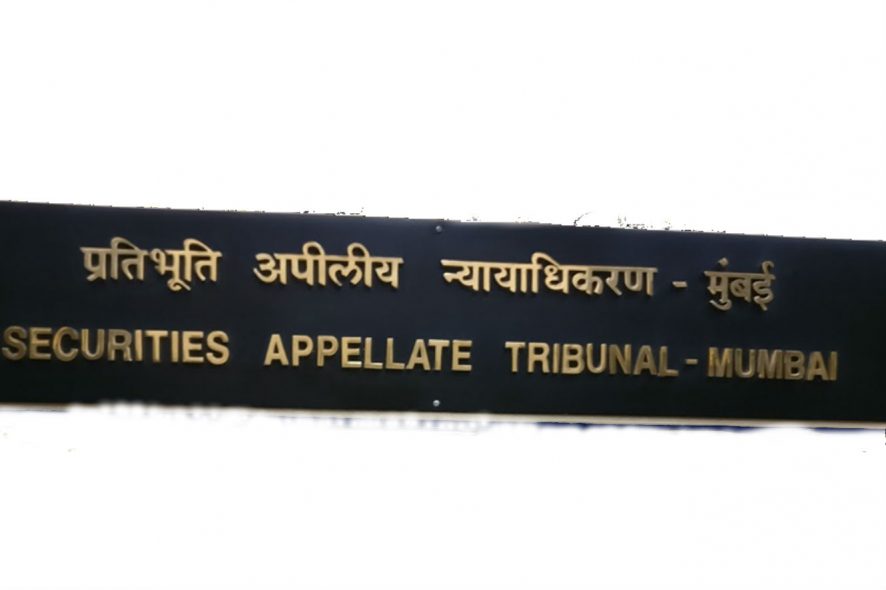Securities Appellate Tribunal (SAT): Justice Tarun Agarwal quashed the order under challenge in the present appeal as Adjudicating Officer has no power to proceed under SEBI Act, 1992 inspite of a moratorium having come into effect under Section 14 of the Insolvency and Bankruptcy Code, 2016 (IBC).
The present appeal has been filed questioning the legality and validity of the order dated 29-05-2020 passed by the Adjudicating Officer under Section 15-I of the Securities and Exchange Board of India Act, 1992 (‘SEBI Act’) whereby the authority has imposed a penalty of for a sum of Rs 20 lakhs under Section 15A (b) and 15HB of the SEBI Act on the appellant which is a housing finance company undergoing corporate insolvency resolution process. The adjudicating officer while imposing the penalty held that the moratorium declared under Section 14 of the IBC would not prevent the adjudicating officer from determining the liability of the corporate debtor and that the moratorium declared under the IBC would be applicable to the enforcement/recovery of the determined liability and that the instant proceedings are in the nature of determining the liability for the alleged non-compliance of the LODR Regulations and other Rules.
Counsel for the appellant relied on judgments titled Alchemist Asset Reconstruction Company Ltd. v. Hotel Gaudavan Pvt. Ltd. (2018) 16 SCC 94 and Rajendra K. Bhuta v. Maharashtra Housing and Area Development Authority 2020 SCC Online 292 and submitted that the provisions of Section 14 of IBC is patently clear and explicit and is not vague which requires use of external aid. It was submitted that when the provision is clear and there is a direct decision of the Supreme Court it was not open to the adjudicating officer to use external aid in interpreting the provisions of Section 14 of the IBC.
Counsel for the respondent submitted that the ambit of the word ‘proceedings’ under Section 14(1) (a) of the IBC needs to be given a wider meaning and if one considers the Insolvency Law Committee Report of March, 2018 one would find that the IBC Act and moratorium prescribed under Section 14 of IBC was basically for the creditors and not for the regulators/statutory authorities, namely, the respondent. It was further submitted that the moratorium declared under Section 14 of the IBC does not prevent the adjudicating officer from determining the liability of the corporate debtor and that the moratorium declared under IBC would be applicable only to the enforcement/recovery of the determined liability.
The Court relied Rajendra K. Bhuta v. Maharashtra Housing and Area Development Authority, 2020 SCC Online 292 which held
“4. The mandate of the new Insolvency Code is that the moment an insolvency petition is admitted, the moratorium that comes into effect Under Section 14(1)(a) expressly interdicts institution or continuation of pending suits or proceedings against corporate debtors.
- This being the case, we are surprised that an arbitration proceeding has been purported to be started after the imposition of the said moratorium and appeals under Section 37 of the Arbitration Act are being entertained. Therefore, we set aside the order of the District Judge dated 6.7.2017 and further state that the effect of Section 14(1) (a) is that the arbitration that has been instituted after the aforesaid moratorium is non est in law.”
Thus the Court observed that after bare perusal of Section 14 of IBC it is clear that pursuant to a moratorium declared under Section 14 the institution of suits or proceedings against the corporate debtor is prohibited or continuation of a suit or proceedings. Further, execution of any judgment or order in any court of law, tribunal, arbitration panel or other authority is also prohibited. It was further observed that where a moratorium has been declared under Section 14 of IBC, the authority which in the instant case is SEBI/AO will have no jurisdiction to institute any proceedings. Where a proceeding has already been instituted and during the pendency of the proceedings a moratorium order is passed under section 14 then the authority is prohibited from continuing with the proceedings.
The Court held that in the instant case the moratorium kicked in when the petition was filed on November, 2019 under Rule 5(a)(i) of the Insolvency and Bankruptcy (Insolvency and liquidation proceedings of financial service provider and application to Adjudicating Authority) Rules, 2019 and thereafter it was admitted on 3-12-2019. The adjudicating officer issued notice subsequently on 24-12-2019. It is quite clear that the proceedings were initiated by the adjudicating officer after the moratorium had come into effect.
In view of the above, the impugned order of penalty is quashed and appeal allowed.[Dewan Housing Finance Corporation Ltd. v. SEBI, 2020 SCC OnLine SAT 162, decided on 09-10-2020]
Arunima Bose, Editorial Assistant has put this story together







